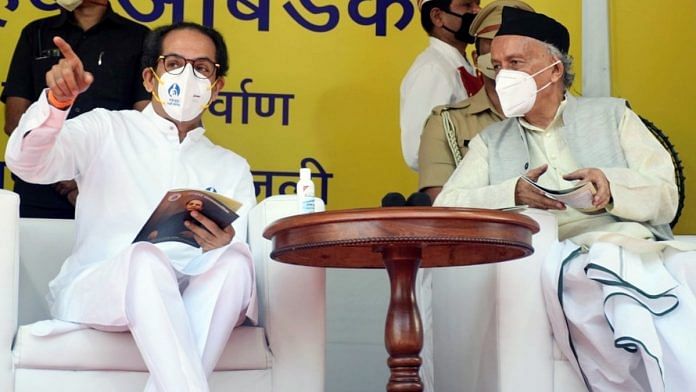Mumbai: Maharashtra Governor Bhagat Singh Koshyari, who has had a long history of tussles with the Maha Vikas Aghadi (MVA), is locked in a conflict with the state’s ruling coalition once again, this time over his remarks on Maratha warrior king Chhatrapati Shivaji.
Speaking at a function in Aurangabad Sunday, Koshyari riled up not just MVA constituents, but also Bharatiya Janata Party (BJP) Rajya Sabha MP Udayanraje Bhosale, a direct descendant of Shivaji, by saying that Samarth Ramdas was Chhatrapati Shivaji’s “guru”.
MVA parties as well as several Maratha organisations staged protests against the remark and demanded Koshyari’s removal as governor, calling it a distortion of history and claiming that Chhatrapati Shivaji’s mother, Jijabai, was his real guru.
Nationalist Congress Party (NCP) MP Supriya Sule tweeted a Bombay High Court order that said, “no record was available to show that Shivaji Maharaj had met Ramdas or Shivaji Maharaj was treating Ramdas as his Guru”. She also shared an old video clip of NCP president and her father Sharad Pawar specifying how stories about Samarth Ramdas being Chhatrapati Shivaji’s teacher are unfounded.
Historians and political experts ThePrint spoke to say that the controversy is age-old and is more political than historical. They also say that the controversy stems from the tendency of certain sections of the society to quote history with a Brahminical narrative.
Also read: Whenever an Aurangzeb has risen, Shivaji, Suheldev have also emerged: PM Modi in Kashi
‘Deep-rooted bias of the upper castes’
Shraddha Kumbhojkar, professor and head of the department of history at the Savitribai Phule Pune University, told ThePrint that the controversy over Koshyari’s remarks is due to a “deep-rooted bias about the Bahujan samaj”.
“There is a deep-rooted societal bias that people from the Bahujan samaj are not capable of doing anything by themselves and there needs to be a Brahminical hand behind it. So, people from the upper castes or those seeking legitimacy from having an association with the upper castes further such narratives,” Kumbhojkar said.
Historians also say there is no valid historical record to show that Samarth Ramdas was Shivaji’s teacher, as Koshyari claimed.
“Ramdas Swami was a saint during Chhatrapati Shivaji’s time and there are at least 12 such names available in the history of saints to whom Chhatrapati had given donations or gifts. There is no valid paper record to even show that Chhatrapati Shivaji Maharaj directly helped Ramdas Swami. Researchers have stated in the past that the papers available suggest this is not historically valid,” Kolhapur-based historian Indrajeet Sawant told ThePrint.
“There are absolutely no references that Ramdas trained Chhatrapati Shivaji Maharaj and then he established his empire. This controversy has been very old, and the reason why it has started is that people from a particular community do not want to believe that Shivaji Maharaj is a self-shaped personality and they would rather believe that someone from a particular community guided him to be who he was. So, people over the years have brought characters to fill this gap,” he added.
A third historian who did not wish to be named said writers such as Babasaheb Purandare have suggested that Dadoji Konddev was Chhatrapati Shivaji’s mentor, but available historical records “at best suggest that Konddev was Chhatrapati Shivaji’s caretaker.”
“What Koshyari said was inaccurate. Many historians such as T.S. Shejwalkar and V.S. Bendre have in the past written that there is no need to establish a connection between Samarth Ramdas Swami and Chhatrapati Shivaji when history suggests none,” the third historian said.
Also read: A ‘Dabang Sansad’ & a ‘gentleman’ — Shivaji descendants & BJP MPs out to lead Maratha protests
‘Koshyari’s comments further BJP, RSS line’
Political commentator Hemant Desai said the BJP and its ideological parent, Rashtriya Swayamsevak Sangh (RSS), have always backed versions of history with an upper-caste lens.
“What the governor said is in line with what the BJP and RSS have maintained. Historian Babasaheb Purandare, who was controversial among the Maratha community for his writings about Chhatrapati Shivaji, had the political patronage of the BJP. Union Home Minister Amit Shah had also visited Babasaheb Purandare’s family in Pune to offer his condolences after his death,” Desai said.
In 2015, the Devendra Fadnavis-led BJP government had conferred the ‘Maharashtra Bhushan’ award on Purandare, sparking criticism from sections of the Maratha community.
Desai added controversies from time to time have helped parties like NCP, which has traditionally had a large Maratha following, consolidate its vote bank.
“In 2004, the controversy over the ban on a book by author James Laine had become an election issue and helped the NCP drum up support. Similarly, the NCP reacting strongly to Koshyari’s remarks will also help the party at a time when there is disenchantment within the Maratha community over the MVA government’s inability to defend the Maratha quota law in the Supreme Court,” Desai said.
In 2004, the Congress-NCP government in Maharashtra had banned a book titled Shivaji: Hindu King in Islamic India by author James Laine after it stirred protests across the state, including vandalism of Pune’s Bhandarkar Institute of Oriental Research, as researchers from the institute had assisted Laine.
(Edited by Manoj Ramachandran)
Also read: Bal Thackeray’s father and Ambedkar used Navratri festivities to counter Brahmin Ganesh utsav



